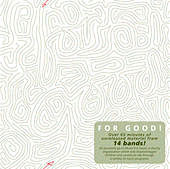Broadcast at The Substation and Psalm 91
Because Singapore is not anywhere near Aunt Beeb's Big Weekend in Dundee, there was some karma-point amassing (but not enough, never enough obviously and therefore useless, for heaven) going on the überfun way at Broadcast at The Substation, in aid of Music For Good.
 During the 13-hour event meant to showcase "local" music talent through gigs, photo exhibitions and short films, there was a dripping air-conditioner upfront; liberal use of yellow cellophane on the fluorescent tubes for the warm look in the White Room; Pat Chng bopping and sound-checking; ETC, "Astrogal", "Supermarket", Ben's mumbly pimping of the gigs at Earshot next Saturday (where they're playing together with Typewriter and highrise), Lennat who wanted more more more rock so "Adolesce" as encore; only Aidil from Couple who, when he intro'ed Tentang Kita, was encouraged by Jack at the back yelling "Maalaayseeaaahh!!!"; curb-squatters and heated discussions about the efficacy of songs in humble C; a fast depleting Asahisweatfumes-to-oxygen ratio; someone in a neon-pink Dragonball wig with a fairy wand, fake crooked teeth and what looked like a plastic banana in her bra; the newly-re-formed Lilac Saints with the Original Lineup including can'trememberthelyrics Rick and theOriginal Eugene doing "To Be the One" (mp3 from a farlesstight previous gig thanks to Joe Ng); no sight of the sorely-missed Concave Scream; the much-publicised auctions for dinner dates with mynickisStyra Ginette Chittick from Astreal and norequestsforfreelegaladviceplease Linda Ong from Lunarin; and Poptart for a midnight snack.
During the 13-hour event meant to showcase "local" music talent through gigs, photo exhibitions and short films, there was a dripping air-conditioner upfront; liberal use of yellow cellophane on the fluorescent tubes for the warm look in the White Room; Pat Chng bopping and sound-checking; ETC, "Astrogal", "Supermarket", Ben's mumbly pimping of the gigs at Earshot next Saturday (where they're playing together with Typewriter and highrise), Lennat who wanted more more more rock so "Adolesce" as encore; only Aidil from Couple who, when he intro'ed Tentang Kita, was encouraged by Jack at the back yelling "Maalaayseeaaahh!!!"; curb-squatters and heated discussions about the efficacy of songs in humble C; a fast depleting Asahisweatfumes-to-oxygen ratio; someone in a neon-pink Dragonball wig with a fairy wand, fake crooked teeth and what looked like a plastic banana in her bra; the newly-re-formed Lilac Saints with the Original Lineup including can'trememberthelyrics Rick and theOriginal Eugene doing "To Be the One" (mp3 from a farlesstight previous gig thanks to Joe Ng); no sight of the sorely-missed Concave Scream; the much-publicised auctions for dinner dates with mynickisStyra Ginette Chittick from Astreal and norequestsforfreelegaladviceplease Linda Ong from Lunarin; and Poptart for a midnight snack.
Much better photos from others here and here.
 For the long early morning trip home, there was a compilation CD of previously-unreleased work put together by the notsogeriatric folks at Aging Youth and sponsored by Bar None (Futon, Force Vomit, Bilateral Relations Monday Sessions all there this month). Sweeet.
For the long early morning trip home, there was a compilation CD of previously-unreleased work put together by the notsogeriatric folks at Aging Youth and sponsored by Bar None (Futon, Force Vomit, Bilateral Relations Monday Sessions all there this month). Sweeet.
The tracklisting is:
1. The Observatory - This Sad Song (Remixed by Rennie Gomes)
2. Camra - White Hearts Lane
3. Stoned Revivals - The New Way
4. Electrico - Hello
5. MUON - Against The Grain
6. B-Quartet - Catwalks
7. Lunarin - Absolution
8. Ugly In The Morning - Carousel
9. TypeWriter - Enemy
10. Elise - Massive Earth
11. Astreal - This Was Wallflower (Remixed by MUON)
12. Phorous - The Glowering
13. The Love Experiment - Orbit Around Me
14. Documentary In Amber - Turnstiles
Half way through the acoustic sets, there was break for Bible study prep and saving the eardrums for the Singapore International Piano Festival, and in the middle of that, like Russian-dolls, a great catchy idea for an evangelistic remix inspired by Deuteronomy and simpleman Mylo (as soon as I get paws on some mixing programmes and equiment and then, if I remember how it goes. Grrr...need to checkout/invent notation for remixing.).
 Psalm 91, Matthew 4 and Luke 4
Psalm 91, Matthew 4 and Luke 4
But about Bible study prep amidst a spot of tea at Ya Kun and the later discussion over hot chocolate at Corduroy & Finch...
What is Psalm 91 asking of us? Blind faith that makes an uncalculated, brainless leap into the darkness?
God's Trustworthiness and Power
The Bible never speaks of blind trust or a leap of faith in the dark. Rather it expects us to trust only those who prove themselves trustworthy. Therefore, it tells of God's promises to us and always appeals to evidence of (1) the trustworthy character; and (2) the ability of God to do what he has promised. Both these traits are important: it's no good God having the ability to do something but if he neglects to fulfil his promises in the end. And it's no use if God is trustworthy with all sorts of good intentions if he doesn't have the ability to carry them out.
David Jackman notes that the Psalmist in Psalm 91:1-2 gives us the four names of God (reflecting his character) that are the basis of our faith in him. He is:
And what does this trustworthy and powerful God promise to those who (1) love him, (2) know his name (have a right relationship with him; and (3) who call upon him (Psalm 91:14-15)?
But literal protection against disease cannot be God's promise here because Jesus, who of all humans surely loved God, knew his name and called upon him in his hour of need, was not saved from a particularly nasty death on the cross.
We are often told that the way to read the Old Testament is to pay attention to the genre of literature and also to let the New Testament interpret the Old. The Psalms are poetic. Therefore, they are given to similies, metaphors, imagery, figurative language and even hyperbole. Keeping this in mind, we look at where the New Testament interprets the Old - in the Matthew 4 and Luke 4 passages set out below.
We must have read these passages at least a hundred times before in both Matthew and Luke's Gospels:
Is it that Satan quotes Psalm 91:11 at Jesus to trick him, and Jesus sufisagestorylike sees through his cunning and fires a pithy rejoinder, and there is applause all around? Not quite.
Or is it that Satan displays a devastating inability to read Scripture in context for which Jesus must issue a terse correction? Non.
Or is it that old Sunday school chestnut about Jesus being a teacherspet goodytwoshoes who always followed the rules, had blind trust in God and so did not ever test him (whatever that means)? Not quite either.
Jesus' pithy quote-in-retort ("You shall not put the Lord your God to the test") is instructive as to the correct interpretation of that piece of Psalm 91 misused by Satan. The quote-in-retort comes from Deuteronomy 6:16.
In Deuteronomy, Israel is just about to enter the Promised Land, and Moses, who is not going in with them is spelling out just how they are to live on the land in right relationship with the God who brought them out of slavery in Egypt and is about to give them a land of their own. He reminds them not to test God as they did at Massah (Exodus 17:1-7, Numbers 20:2-13) when, being more than merely ungrateful, they distrusted God's intention rescuing them from Egypt and did not believe that he would do what he promised.
Moses' swansong in Deuteronomy 32 summarises the sad events of the Exodus and after: first Moses sang of the wonderous characteristics of God, his greatness, his creative power, his lordship over everything he made, his sustenance of the universe he created, and so how God brought Israel out of Egypt and cared for her like an eagle caring for his young (Deuteronomy 32:11), protecting Israel from her enemies and establishing her in a good and fruitful land. But Israel, instead of staying in a faithful relationship with this God who so loved her, worshipped other madeup gods who neither cared for them, created them nor even (and importantly) existed. And this provoked God, rightly, to anger. He pronounced his judgement on them:
So if we love God and have a right relationship with him, what he promises is not protection from all kinds of evils, but that we shall be protected from arrows, plagues, pestilences, lions and snakes as allusions to, as word pictures of, his punishment on the wicked (and not that these things per se are necessarily his judgement on sinners, but just in this context). He promises us that we shall have no fear of the most fearsome thing there is: God's judgement on and punishment for the wicked. We shall not wait in utter dread and trembling expectation for the rod of God's wrath to fall upon on our puny backs. Hell is a terrible destiny to have.
Instead, to those who trust him, he will show his salvation. And for this life, though God does not promise it will be trouble-free, he does promise his comforting presence. We are secure in God's hands, knowing that Christ has died in our place, for our sins, trusting that God's loving providence controls all and nothing is allowed to happen to us that is not for our ultimate good.
 During the 13-hour event meant to showcase "local" music talent through gigs, photo exhibitions and short films, there was a dripping air-conditioner upfront; liberal use of yellow cellophane on the fluorescent tubes for the warm look in the White Room; Pat Chng bopping and sound-checking; ETC, "Astrogal", "Supermarket", Ben's mumbly pimping of the gigs at Earshot next Saturday (where they're playing together with Typewriter and highrise), Lennat who wanted more more more rock so "Adolesce" as encore; only Aidil from Couple who, when he intro'ed Tentang Kita, was encouraged by Jack at the back yelling "Maalaayseeaaahh!!!"; curb-squatters and heated discussions about the efficacy of songs in humble C; a fast depleting Asahisweatfumes-to-oxygen ratio; someone in a neon-pink Dragonball wig with a fairy wand, fake crooked teeth and what looked like a plastic banana in her bra; the newly-re-formed Lilac Saints with the Original Lineup including can'trememberthelyrics Rick and theOriginal Eugene doing "To Be the One" (mp3 from a farlesstight previous gig thanks to Joe Ng); no sight of the sorely-missed Concave Scream; the much-publicised auctions for dinner dates with mynickisStyra Ginette Chittick from Astreal and norequestsforfreelegaladviceplease Linda Ong from Lunarin; and Poptart for a midnight snack.
During the 13-hour event meant to showcase "local" music talent through gigs, photo exhibitions and short films, there was a dripping air-conditioner upfront; liberal use of yellow cellophane on the fluorescent tubes for the warm look in the White Room; Pat Chng bopping and sound-checking; ETC, "Astrogal", "Supermarket", Ben's mumbly pimping of the gigs at Earshot next Saturday (where they're playing together with Typewriter and highrise), Lennat who wanted more more more rock so "Adolesce" as encore; only Aidil from Couple who, when he intro'ed Tentang Kita, was encouraged by Jack at the back yelling "Maalaayseeaaahh!!!"; curb-squatters and heated discussions about the efficacy of songs in humble C; a fast depleting Asahisweatfumes-to-oxygen ratio; someone in a neon-pink Dragonball wig with a fairy wand, fake crooked teeth and what looked like a plastic banana in her bra; the newly-re-formed Lilac Saints with the Original Lineup including can'trememberthelyrics Rick and theOriginal Eugene doing "To Be the One" (mp3 from a farlesstight previous gig thanks to Joe Ng); no sight of the sorely-missed Concave Scream; the much-publicised auctions for dinner dates with mynickisStyra Ginette Chittick from Astreal and norequestsforfreelegaladviceplease Linda Ong from Lunarin; and Poptart for a midnight snack.Much better photos from others here and here.
 For the long early morning trip home, there was a compilation CD of previously-unreleased work put together by the notsogeriatric folks at Aging Youth and sponsored by Bar None (Futon, Force Vomit, Bilateral Relations Monday Sessions all there this month). Sweeet.
For the long early morning trip home, there was a compilation CD of previously-unreleased work put together by the notsogeriatric folks at Aging Youth and sponsored by Bar None (Futon, Force Vomit, Bilateral Relations Monday Sessions all there this month). Sweeet.The tracklisting is:
1. The Observatory - This Sad Song (Remixed by Rennie Gomes)
2. Camra - White Hearts Lane
3. Stoned Revivals - The New Way
4. Electrico - Hello
5. MUON - Against The Grain
6. B-Quartet - Catwalks
7. Lunarin - Absolution
8. Ugly In The Morning - Carousel
9. TypeWriter - Enemy
10. Elise - Massive Earth
11. Astreal - This Was Wallflower (Remixed by MUON)
12. Phorous - The Glowering
13. The Love Experiment - Orbit Around Me
14. Documentary In Amber - Turnstiles
Half way through the acoustic sets, there was break for Bible study prep and saving the eardrums for the Singapore International Piano Festival, and in the middle of that, like Russian-dolls, a great catchy idea for an evangelistic remix inspired by Deuteronomy and simpleman Mylo (as soon as I get paws on some mixing programmes and equiment and then, if I remember how it goes. Grrr...need to checkout/invent notation for remixing.).
 Psalm 91, Matthew 4 and Luke 4
Psalm 91, Matthew 4 and Luke 4But about Bible study prep amidst a spot of tea at Ya Kun and the later discussion over hot chocolate at Corduroy & Finch...
What is Psalm 91 asking of us? Blind faith that makes an uncalculated, brainless leap into the darkness?
God's Trustworthiness and Power
The Bible never speaks of blind trust or a leap of faith in the dark. Rather it expects us to trust only those who prove themselves trustworthy. Therefore, it tells of God's promises to us and always appeals to evidence of (1) the trustworthy character; and (2) the ability of God to do what he has promised. Both these traits are important: it's no good God having the ability to do something but if he neglects to fulfil his promises in the end. And it's no use if God is trustworthy with all sorts of good intentions if he doesn't have the ability to carry them out.
David Jackman notes that the Psalmist in Psalm 91:1-2 gives us the four names of God (reflecting his character) that are the basis of our faith in him. He is:
- the Most High (Psalm 91:1): a name of total sovereignty and authority. There is no higher Court of Appeal, no greater power. God is the Lord of history, of the universe. He is the Lord who governs all things according to his will;
- the Almighty (El Shaddai, Psalm 91:1): a name used mainly in the Patriarchal period, recalling God's works of old. He is a God of mountain-like stability, but always in the context of his grace. He puts his power at work for the good of his people. God, bountiful giver, pours out blessings on his own; the inexhaustible resources of the Lord at the disposal of his children;
- the LORD (Yahweh, Psalm 91:2) is the covenant name of God, revealing the character of God to his own. The personal name of God (the sort used not by outsiders but only by his own family), given to Moses at the burning bush (Exodus 3). He is the I AM, the eternal present-tense God, unchanging, bound to his people by an oath that can never be broken, in New Testament terms sealed by the precious blood of Christ. The God who will never let us go, let us down, or give us up; and finally,
- my God (Elohim, Psalm 91:2). It is plural, indicating the Trinity, the Godhead, but at the same time, made wonderfully personal. He is mine. And in that little word "my", faith moves from theory to experience. This God, the only true god, he is mine and I am his; all that he is in himself, he is to me. It could not be otherwise. He cannot change, so it is all there for me. This is where I must build my home; here are my roots, living in this God, the supreme reality of my life; the heart of what it means to be a Christian.
And what does this trustworthy and powerful God promise to those who (1) love him, (2) know his name (have a right relationship with him; and (3) who call upon him (Psalm 91:14-15)?
...he will deliver you from the snare of the fowlerDuring the SARS outbreak, some churches taught their members to chant and claim the literal promises of Psalm 91 as some magick protection against the deadly disease. And when Christians died from SARS, there were tears and recriminations and accusations of faithlessness all around.
and from the deadly pestilence.
He will cover you with his pinions,
and under his wings you will find refuge;
his faithfulness is a shield and buckler.
You will not fear the terror of the night,
nor the arrow that flies by day,
nor the pestilence that stalks in darkness,
nor the destruction that wastes at noonday.
A thousand may fall at your side,
ten thousand at your right hand,
but it will not come near you.
You will only look with your eyes
and see the recompense of the wicked.
Because you have made the LORD your dwelling place-
the Most High, who is my refuge-
no evil shall be allowed to befall you,
no plague come near your tent.
For he will command his angels concerning you
to guard you in all your ways.
On their hands they will bear you up,
lest you strike your foot against a stone.
You will tread on the lion and the adder;
the young lion and the serpent you will trample underfoot. (Psalm 91:3-13)
But literal protection against disease cannot be God's promise here because Jesus, who of all humans surely loved God, knew his name and called upon him in his hour of need, was not saved from a particularly nasty death on the cross.
We are often told that the way to read the Old Testament is to pay attention to the genre of literature and also to let the New Testament interpret the Old. The Psalms are poetic. Therefore, they are given to similies, metaphors, imagery, figurative language and even hyperbole. Keeping this in mind, we look at where the New Testament interprets the Old - in the Matthew 4 and Luke 4 passages set out below.
We must have read these passages at least a hundred times before in both Matthew and Luke's Gospels:
Then the devil took him to the holy city and set him on the pinnacle of the temple and said to him, "If you are the Son of God, throw yourself down, for it is written,
"'He will command his angels concerning you,' and "'On their hands they will bear you up, lest you strike your foot against a stone.'"
Jesus said to him, "Again it is written, 'You shall not put the Lord your God to the test.'" (Matthew 4:5-7)
And he took him to Jerusalem and set him on the pinnacle of the temple and said to him, "If you are the Son of God, throw yourself down from here, for it is written,"'He will command his angels concerning you, to guard you,' and "'On their hands they will bear you up, lest you strike your foot against a stone.'"What is wrong with Satan's quotation of Psalm 91:11?
And Jesus answered him, "It is said, 'You shall not put the Lord your God to the test.'" (Luke 4:9-12)
Is it that Satan quotes Psalm 91:11 at Jesus to trick him, and Jesus sufisagestorylike sees through his cunning and fires a pithy rejoinder, and there is applause all around? Not quite.
Or is it that Satan displays a devastating inability to read Scripture in context for which Jesus must issue a terse correction? Non.
Or is it that old Sunday school chestnut about Jesus being a teacherspet goodytwoshoes who always followed the rules, had blind trust in God and so did not ever test him (whatever that means)? Not quite either.
Jesus' pithy quote-in-retort ("You shall not put the Lord your God to the test") is instructive as to the correct interpretation of that piece of Psalm 91 misused by Satan. The quote-in-retort comes from Deuteronomy 6:16.
In Deuteronomy, Israel is just about to enter the Promised Land, and Moses, who is not going in with them is spelling out just how they are to live on the land in right relationship with the God who brought them out of slavery in Egypt and is about to give them a land of their own. He reminds them not to test God as they did at Massah (Exodus 17:1-7, Numbers 20:2-13) when, being more than merely ungrateful, they distrusted God's intention rescuing them from Egypt and did not believe that he would do what he promised.
Moses' swansong in Deuteronomy 32 summarises the sad events of the Exodus and after: first Moses sang of the wonderous characteristics of God, his greatness, his creative power, his lordship over everything he made, his sustenance of the universe he created, and so how God brought Israel out of Egypt and cared for her like an eagle caring for his young (Deuteronomy 32:11), protecting Israel from her enemies and establishing her in a good and fruitful land. But Israel, instead of staying in a faithful relationship with this God who so loved her, worshipped other madeup gods who neither cared for them, created them nor even (and importantly) existed. And this provoked God, rightly, to anger. He pronounced his judgement on them:
And I will heap disasters upon them;Very familiar imagery to the readers of Psalm 91.
I will spend my arrows on them;
they shall be wasted with hunger,
and devoured by plague
and poisonous pestilence;
I will send the teeth of beasts against them,
with the venom of things that crawl in the dust. (Deuteronomy 32:23-24)
So if we love God and have a right relationship with him, what he promises is not protection from all kinds of evils, but that we shall be protected from arrows, plagues, pestilences, lions and snakes as allusions to, as word pictures of, his punishment on the wicked (and not that these things per se are necessarily his judgement on sinners, but just in this context). He promises us that we shall have no fear of the most fearsome thing there is: God's judgement on and punishment for the wicked. We shall not wait in utter dread and trembling expectation for the rod of God's wrath to fall upon on our puny backs. Hell is a terrible destiny to have.
Instead, to those who trust him, he will show his salvation. And for this life, though God does not promise it will be trouble-free, he does promise his comforting presence. We are secure in God's hands, knowing that Christ has died in our place, for our sins, trusting that God's loving providence controls all and nothing is allowed to happen to us that is not for our ultimate good.









0 Comments:
Post a Comment
Subscribe to Post Comments [Atom]
<< Home